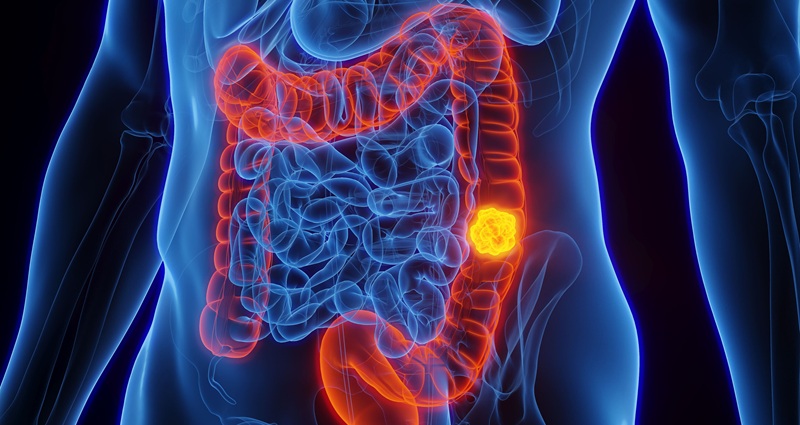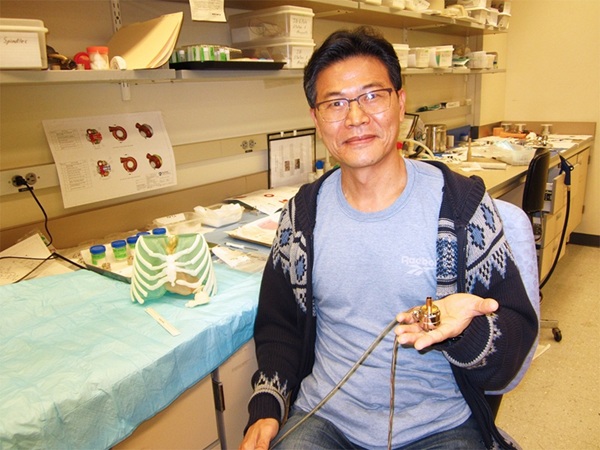Neurostimulator Implant Uses Bioelectronic Technology to Treat Inflammatory Bowel Disease
|
By HospiMedica International staff writers Posted on 28 Dec 2023 |
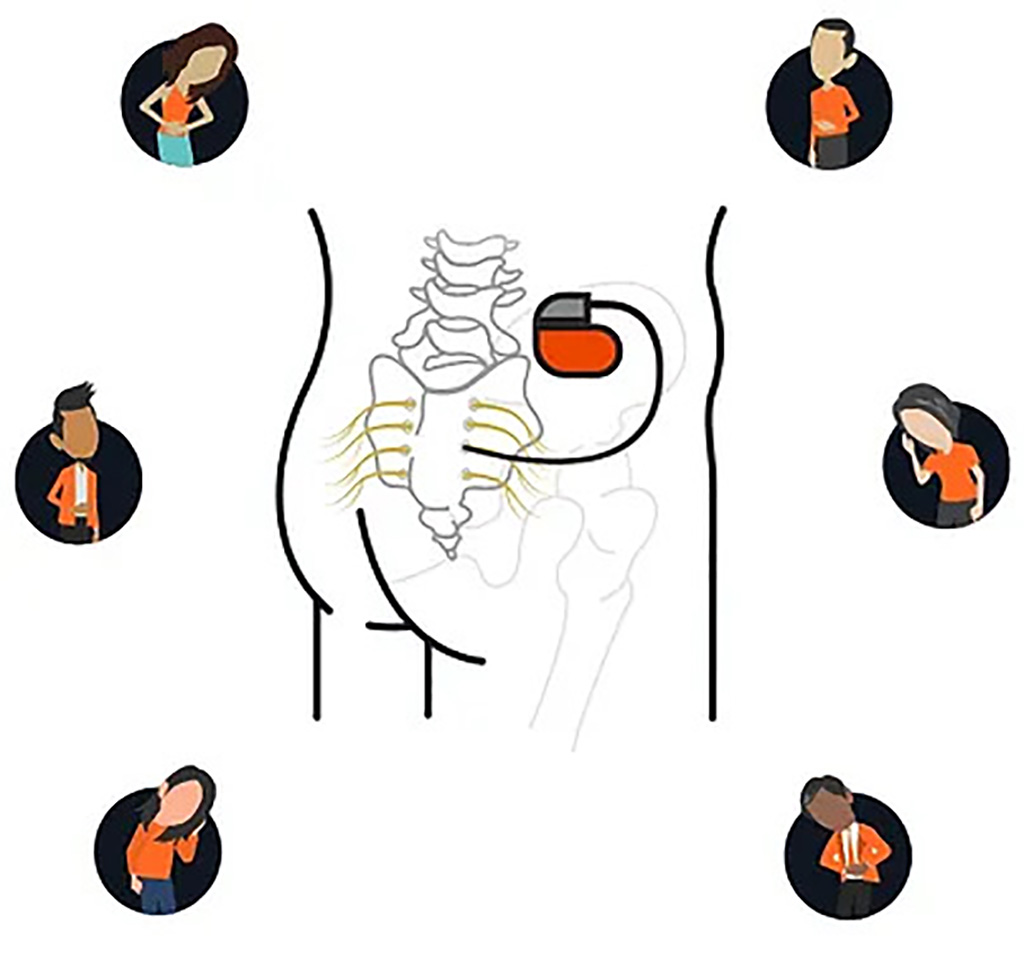
Inflammatory Bowel Disease (IBD) is a chronic, idiopathic inflammatory condition characterized by inflammation in the gastrointestinal tract, primarily manifesting as Crohn's disease and ulcerative colitis. Despite a range of biologic treatments available, effectively managing IBD remains a significant hurdle. Many patients experience non-responsiveness or diminished efficacy over time with existing therapies, leading to continued suffering and, frequently, the need for surgical intervention in severe cases. Consequently, the medical community is seeking new and more effective treatments for IBD. Now, a clinical trial is assessing the potential of sacral nerve stimulation (SNS) in treating Crohn’s disease and ulcerative colitis using a small implantable device that emits mild electrical impulses to stimulate a specific nerve pathway to reduce inflammation and improve IBD symptoms.
Boomerang Medical (Mountain View, CA, USA) is investigating the potential of SNS to activate nerve pathways to reduce inflammation and symptoms associated with Crohn’s disease and ulcerative colitis. SNS involves a small medical device implanted near the tailbone that delivers gentle electrical pulses to the sacral nerve. This method has been FDA-approved and utilized for over two decades to treat conditions like overactive bladder and fecal incontinence. Granted breakthrough device designation by the FDA in March 2023, Boomerang’s neurostimulator is designed for subcutaneous implantation via a minimally invasive procedure.
The ongoing trial aims to evaluate the safety and efficacy of this device in individuals with mild to moderate Crohn’s disease and ulcerative colitis, including those who haven't previously undergone advanced biologic therapies. This unique aspect of the study, BOOM-IBD, allows for a broader patient inclusion compared to typical IBD trials. This single-group, open-label study plans to enroll 40 adult participants diagnosed with either Crohn’s disease or ulcerative colitis and is actively recruiting at eight clinical sites across the United States. Boomerang has successfully advanced to the second stage of pilot study enrollment, examining the efficacy of its bioelectronic technology in IBD treatment.
“We are thrilled to enroll the first patients in this clinical trial of our breakthrough bioelectronic device for IBD,” said Heather Simonsen, CEO of Boomerang Medical. “This trial represents a major milestone in our efforts to develop a new therapeutic approach for patients suffering from Crohn's disease and ulcerative colitis. We are grateful for the support of our clinical trial partners and the FDA, and we look forward to advancing this important work.”
Related Links:
Boomerang Medical
Latest Critical Care News
- AI-Enhanced Wearables Could Transform Type 2 Diabetes and Prediabetes Care
- Breathable Electronic Skin Paves Way for Next-Generation Wearable Devices
- AI Transforming Colon Cancer Diagnosis
- Ventricular Assist Device Offers Long-Term Use in Children Waiting for Donor Heart
- Precision Approach Improves Immunotherapy Effectiveness for ICU Patients with Sepsis
- Soft Robots Could Donate Their Heart to Humans
- Bioadhesive Strategy Prevents Fibrosis Around Device Implants on Peripheral Nerves
- Miniature Non-Invasive Robotic Catheters to Improve Infertility Treatments
- Stick-On Patch Monitors Baby's Movements In Utero
- EEG-Based AI Technology Accurately Diagnoses Alzheimer’s and Dementia
- Robot Lymphatic System Paves Way for Self-Powered Wearables and Machines
- Focused Ultrasound Technique Successfully Treats Pediatric Brain Cancer
- Nasal Drops Fight Brain Tumors Noninvasively
- AI Helps Optimize Therapy Selection and Dosing for Septic Shock
- Glowing Bacteria ‘Pills’ for Detecting Gut Diseases Could Eliminate Colonoscopies
- Skin-Permeable Polymer Patch Delivers Insulin Non-Invasively Through Skin
Channels
Critical Care
view channel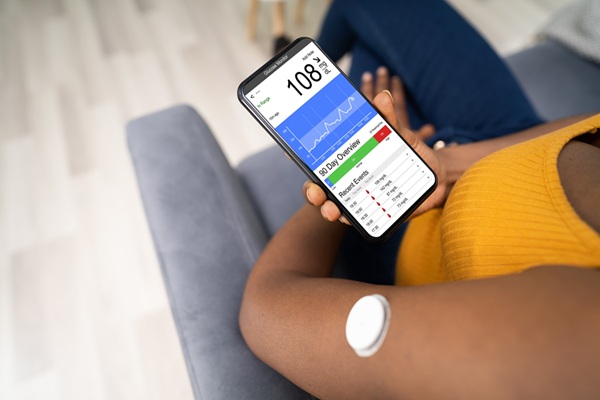
AI-Enhanced Wearables Could Transform Type 2 Diabetes and Prediabetes Care
Artificial intelligence (AI)–powered wearable devices, particularly continuous glucose monitors, are rapidly changing how people with prediabetes and Type 2 diabetes understand and manage their blood sugar.... Read more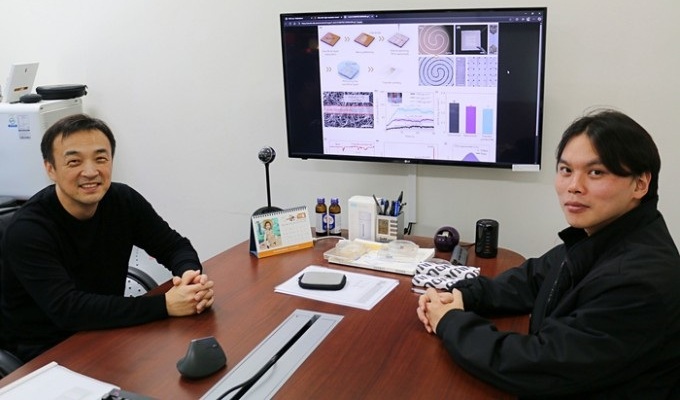
Breathable Electronic Skin Paves Way for Next-Generation Wearable Devices
Electronic skin devices are designed to adhere closely to the human body to monitor health and biosignals, but long-term use often leads to skin irritation caused by trapped sweat and poor breathability.... Read morePatient Care
view channel
Revolutionary Automatic IV-Line Flushing Device to Enhance Infusion Care
More than 80% of in-hospital patients receive intravenous (IV) therapy. Every dose of IV medicine delivered in a small volume (<250 mL) infusion bag should be followed by subsequent flushing to ensure... Read more
VR Training Tool Combats Contamination of Portable Medical Equipment
Healthcare-associated infections (HAIs) impact one in every 31 patients, cause nearly 100,000 deaths each year, and cost USD 28.4 billion in direct medical expenses. Notably, up to 75% of these infections... Read more
Portable Biosensor Platform to Reduce Hospital-Acquired Infections
Approximately 4 million patients in the European Union acquire healthcare-associated infections (HAIs) or nosocomial infections each year, with around 37,000 deaths directly resulting from these infections,... Read moreFirst-Of-Its-Kind Portable Germicidal Light Technology Disinfects High-Touch Clinical Surfaces in Seconds
Reducing healthcare-acquired infections (HAIs) remains a pressing issue within global healthcare systems. In the United States alone, 1.7 million patients contract HAIs annually, leading to approximately... Read moreHealth IT
view channel
EMR-Based Tool Predicts Graft Failure After Kidney Transplant
Kidney transplantation offers patients with end-stage kidney disease longer survival and better quality of life than dialysis, yet graft failure remains a major challenge. Although a successful transplant... Read more
Printable Molecule-Selective Nanoparticles Enable Mass Production of Wearable Biosensors
The future of medicine is likely to focus on the personalization of healthcare—understanding exactly what an individual requires and delivering the appropriate combination of nutrients, metabolites, and... Read moreBusiness
view channel
Philips and Masimo Partner to Advance Patient Monitoring Measurement Technologies
Royal Philips (Amsterdam, Netherlands) and Masimo (Irvine, California, USA) have renewed their multi-year strategic collaboration, combining Philips’ expertise in patient monitoring with Masimo’s noninvasive... Read more
B. Braun Acquires Digital Microsurgery Company True Digital Surgery
The high-end microsurgery market in neurosurgery, spine, and ENT is undergoing a significant transformation. Traditional analog microscopes are giving way to digital exoscopes, which provide improved visualization,... Read more
CMEF 2025 to Promote Holistic and High-Quality Development of Medical and Health Industry
The 92nd China International Medical Equipment Fair (CMEF 2025) Autumn Exhibition is scheduled to be held from September 26 to 29 at the China Import and Export Fair Complex (Canton Fair Complex) in Guangzhou.... Read more












